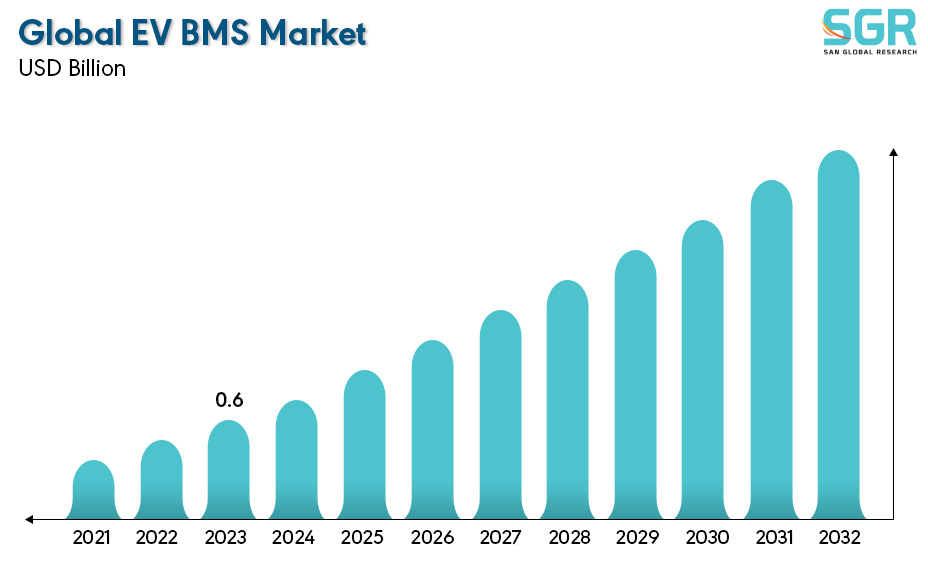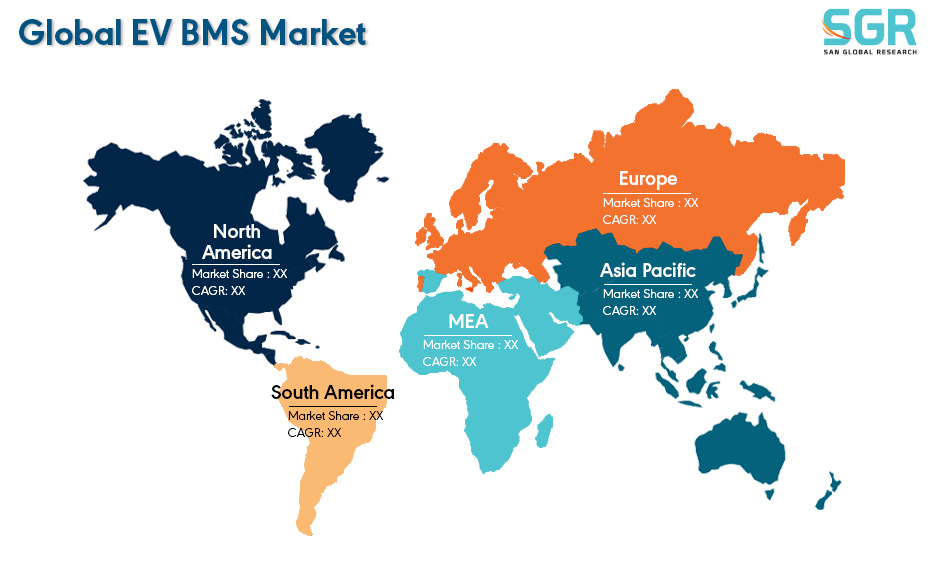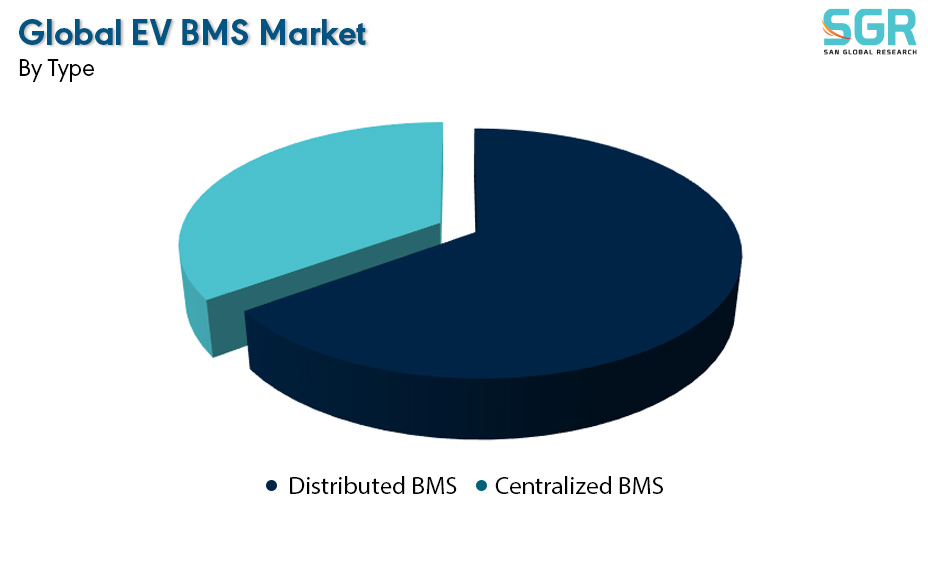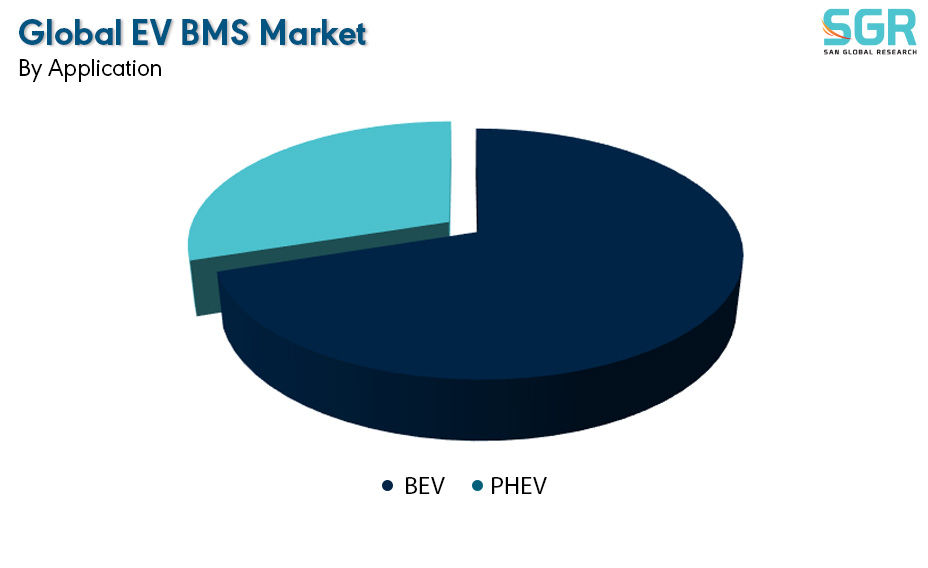Global EV BMS Market is estimated to be worth USD 6.7 Billion in 2022 and is projected to grow at a CAGR of 31.6% between 2023 to 2032. The study has considered the base year as 2022, which estimates the market size of market and the forecast period is 2023 to 2032. The report analyzes and forecasts the market size, in terms of value (USD Billion), for the market. The report segments the market and forecasts it by type, by application region/country.

The global Electric Vehicle Battery Management System (BMS) market has been experiencing substantial growth and evolution, fueled by the rapid adoption of electric vehicles (EVs) worldwide. The BMS plays a pivotal role in monitoring, controlling, and managing the performance and lifespan of EV batteries, ensuring their efficiency, safety, and reliability. With the increasing emphasis on sustainability and reducing carbon footprints, governments' initiatives, stringent regulations promoting clean energy, and technological advancements have significantly propelled the demand for electric vehicles. This surge in EV production has consequently driven the demand for efficient BMS solutions, offering features like state-of-charge (SoC) estimation, thermal management, cell balancing, and fault detection. As the automotive industry pivots towards electrification, the global Electric Vehicle BMS market is poised for continuous expansion, innovation, and heightened competition among key players striving to offer cutting-edge solutions that enhance EV performance while addressing environmental concerns.

Region wise Comparison:
North America, The United States and Canada have seen a steady rise in electric vehicle sales, albeit at a slightly slower pace compared to some regions in Asia and Europe. Tesla's dominance in the EV market and other automakers' initiatives to expand their electric vehicle offerings have contributed to the growth of the BMS market in North America. Additionally, government incentives and the commitment to reducing greenhouse gas emissions have supported the expansion of the electric vehicle and BMS markets in this region.
European countries have also been actively embracing electric vehicles, driven by stringent emission regulations and a growing environmental consciousness. Countries like Norway, the Netherlands, and Germany have witnessed rapid EV adoption rates. As a result, the European BMS market has been expanding, with several key players investing in advanced BMS technology to cater to the increasing demand for electric vehicles in the region.

Asia-Pacific (APAC): This region has been at the forefront of electric vehicle adoption, primarily led by countries like China, Japan, and South Korea. China, as the largest EV market globally, has been a significant driver of BMS market growth in the APAC region due to its extensive EV production and government incentives promoting electric vehicle adoption. Additionally, advancements in technology, increased investments in infrastructure, and supportive government policies have further propelled the growth of the BMS market in this region.
South America, Africa, and Oceania have been gradually entering the electric vehicle space, albeit at a slower pace compared to the aforementioned regions. Factors such as infrastructure development, government policies, and consumer acceptance play crucial roles in shaping the growth of the BMS market in these continents.

Segmentation:
The Global EV BMS Market is segmented by type, by application and region/country.
By Type:

Based on the type, the Global EV BMS Market is bifurcated into Distributed BMS & Centralized BMS – where the Distributed BMS are dominating and ahead in terms of share.
The concept of distributed Battery Management Systems (BMS) in the global Electric Vehicle (EV) BMS market represents a paradigm shift in battery management technology. Distributed BMS involves the decentralization of battery monitoring and control functions, distributing them across individual battery cells or modules within an electric vehicle. This innovative approach offers several advantages, including enhanced safety, improved efficiency, and optimized performance of EV batteries. By placing monitoring sensors and control units closer to each battery cell or module, distributed BMS enables more accurate real-time data collection, precise cell-level monitoring, and proactive management of battery health.
By Application:

Based on the application, the Global EV BMS Market is bifurcated into BEV & PHEV – where BEV is dominating and ahead in terms of share.
On the basis of region
North America
Europe
Asia Pacific
South America and
Middle East and Africa
In 2022, North America is anticipated to dominate the Global EV BMS Market with market revenue of XX USD Million with a registered CAGR of XX%.
Key Players:
The key market players operating in the Global EV BMS Market include
- FINDREAMS BATTERY
- TESLA
- CATL
- LG INNOTEK
- UAES
- PREH
- HYUNDAI MOBIS
- FICOSA
- DENSO
- VREMT
- NEUSOFT REACH
- GOTION HIGH TECH
Drivers:
Growing sector across the globe
The global Electric Vehicle Battery Management System (BMS) market is driven by multifaceted factors contributing to its rapid growth and evolution. Key drivers include stringent environmental regulations aimed at reducing carbon emissions, prompting automakers to accelerate their transition towards electric mobility. Government incentives, subsidies, and initiatives encouraging the adoption of electric vehicles further bolster this market expansion. Technological advancements in battery technologies and BMS solutions, focusing on enhancing energy efficiency, range, and charging speeds, serve as catalysts for market growth. Rising consumer awareness and acceptance of electric vehicles, driven by concerns about air quality and sustainability, fuel the demand for more sophisticated BMS technologies ensuring battery safety, longevity, and optimal performance. Additionally, increasing investments by automotive manufacturers and technology companies in research and development to innovate and improve BMS capabilities play a pivotal role in propelling the global Electric Vehicle BMS market forward.
Opportunity:
Evolving Market
The global Electric Vehicle Battery Management System (BMS) market presents a spectrum of opportunities amidst the burgeoning transition toward electric mobility. One significant opportunity lies in the continuous advancement and innovation of BMS technology. As the demand for electric vehicles escalates, there is a growing need for more sophisticated and efficient BMS solutions that offer enhanced features such as predictive maintenance, improved energy management, and increased safety measures. Additionally, collaborations between automotive manufacturers, battery suppliers, and technology firms pave the way for novel developments in BMS, creating opportunities for partnerships and joint ventures. The expanding electric vehicle infrastructure, including charging networks and battery recycling facilities, offers another avenue for growth in the BMS market. Moreover, the integration of smart grid technology and the Internet of Things (IoT) into BMS systems presents opportunities for optimizing energy usage and enabling vehicle-to-grid (V2G) capabilities, allowing electric vehicles to feed energy back into the grid. Overall, the global Electric Vehicle BMS market is rife with opportunities for innovation, collaboration, and expansion in tandem with the escalating adoption of electric vehicles worldwide.

 Description
Description
 Gera Imperium Rise,
Gera Imperium Rise,  +91 9209275355
+91 9209275355


